TAPE 80/SHG/01
THIS TAPE HAS BEEN RECORDED ON APRIL 30TH 1980 IN THE WRAPPING ROOM AT SPRING VALE MILL, CHARLES LANE, HASLINGDEN. THE INFORMANT IS MAURICE HAMMERTON, DEVILLER. THE INTERVIEWER IS MARY HUNTER.
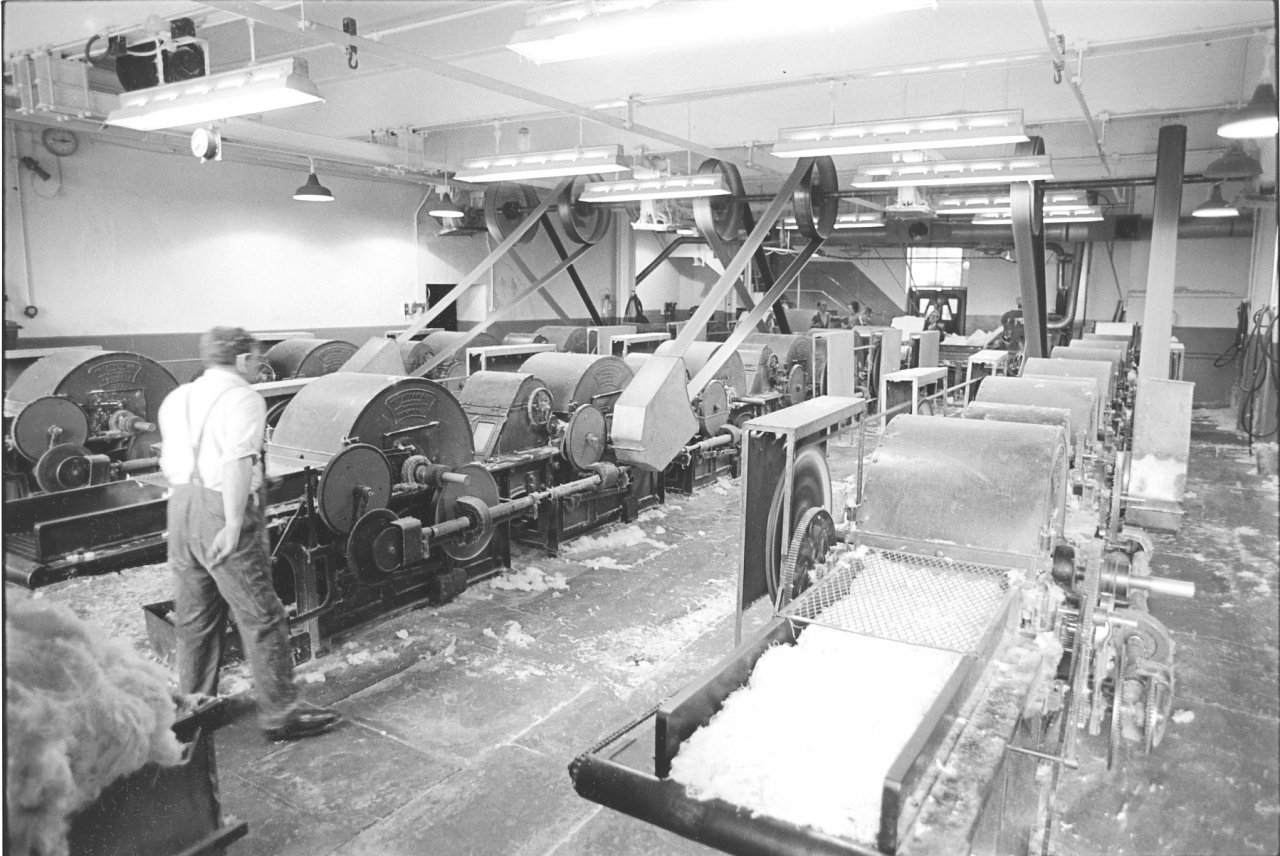
Maurice Hammerton at work with his devils.
Now then Maurice, I’m very lucky to have you here today because I arrived this morning and discovered that this was your last day here so I’m very pleased that you are here to do these tapes today before you go today. Now were you born in this valley?
R- No I was actually born in Lancaster, Skerton. I came to Church, that’s part of Accrington in 1934, we came to Church, and I lived the biggest majority of my life in Accrington.
What did your parents do?
R- Well my father was a printer, the Ajax Press, Accrington.
In the where?
R- Ajax Press, Oxford Street, Accrington. He started as a miner and he took a business on - he became a compositor. You know… and he learned the printing trade. Actually he wanted me to go in that but like I had other ideas. But my mother was a weaver. My mother worked at Highams.. ever sin’ I can remember anyway. She’s died now, but she worked there for years. Higham’s.
Where’s Highams?
R- Wood Nook, Accrington.
So you’d always wanted to go in the cotton industry had you?
R- Yes. I mean cotton was boomin’ then, at that particular time and when I left school I was tried to be talked into going into printing but I wasn’t clever enough actually to go into printing, I was a bit thick really
Oh no
R- Yes, put it down to that, but I wanted to go into cotton . I had already been into the mill to help my mother run the looms and things like that and I was very interested in it. So, I applied for a job at Barnes and Rothwells at Church when I was 15, just turned 15.
Were they weavers?
R- Yes they were weaving, cardroom and spinning. Waste they call it. I mean this type of cotton, you know. I applied (for) a job. £2.17 6d a week. That was the start, you know.
What would that be? About 1940..
R- Six. Correct , yes, 1946, and it was half past seven while half past five and Saturday morning, at that particular time. And I worked there up to going in the forces, in the army, I did three years in the army and then when I came out I came back in the same mill. Mind you I started on tubing and I had already worked my way to cotton carrying, which was good money, £4 odd then, cotton carrying. I was carrying off 5 row of devils and from there I went on scutcher tenting. When I came out [of the army] he found me a job, like they was full up at the time but they fit me in – I went back on the doubler actually, doubler tenting, and from there I went on to scutcher tenting and from there to stripping and grinding. Well I learned stripping and grinding, you’d to wait either of somebody dying, or somebody to get another job because they never finished on that job. Some men had been there what, years.
And did you have to have any training for that? Like, did you have to go to night school?
R- No, but in between that they sent me to Stanhill Ring (Spinning Company, Oswaldtwistle) which I learned the other type of grinding which I received a card for to prove that I was trained as a stripper and grinder, that meant that I could go either into fine or shoddy. They called it shoddy – waste – really, like, but I preferred this type you know and when I came back they asked me if I’d go into devilling. Now devilling was a job on its own. You’d to go through really all those things to become a deviller. You had to know what you was doing, I mean like I went on devilling which I stayed on for like until they closed. They scrapped the devils at that particular time - I’m going back a few years now. They was scrapped. So I went back then on the stripping and grinding.
What did they do then? If they scrapped the devils?
R- Well, they just went on ordinary combing machines, breaking up machines, same as they have here, the blending machines. Straight off the bale. They did away with hard waste altogether.
Oh I see. They just didn’t bring it in.
R- They bought the comber, the comber bales you see, and they just processed that. Cut the devil waste out.
Yes, I see.
R- And scrapped them. So I went back on stripping and grinding.
And this is all at the same firm.
R- Yes, I started there in 1964 and they switched to ring actually. They were double cards then and they turned them, switched them over to.. the same cards but with double bobbins on.. condenser ring. Now there was one or two like me made redundant so I came up to Warburton’s Sykeside Mill, and there I stopped until 1969 and I was made redundant there on stripping and grinding and from there I went to Ilex at Rawtenstall. Well I went scutcher tenting there and then I read about the job at Spring Vale. That was 1972. I came down.
What was the job advertised as?
R- It wasn’t actually advertised. I only heard like rumours, like, so naturally I came down, because it was a lot nearer for me and he said I can offer you a job on devilling, but I said what sort of devils, I thought they had been scrapped years ago, but he said I’ll take you in and let you have a look and when I see them I nearly had a fit. I thought them had gone out of existence. Well, I went on there with a promise of grinding, and from then on I stayed as I am, when I applied for grinding they offered me if I ‘d stay on that particular job then, I’d be right, so then I have been happy really, you know.
Even though you never got to do grinding?
R- Really, I wasn’t really bothered about grinding, you know, not once I was settled in the job I was doing. I was content to go along because I mean I never seen these for well years until I come in here. I thought well those have definitely been scrapped. Six cylinder Tatham’s devils, you know. I was absolutely astonished. I didn’t even know they had them here.
Who’d have thought that in 1980 they would still be running eh?
R- And they’re still here. Incredible. That was 1964, when they scrapped those and I thought that was the last of ‘em, because I had five row there, and three row were a doddle, like towards five.
And that’s what we’ve got here? Three rows?
R- We’ve three rows here and a small one, like, a one cylinder one. So I have been happy in my job really, like its just like when you’ve worked so long in a trade, you go out of one job, like its going home and then coming back home really because its just a piece of cake.
You mentioned a while back cotton carrying?
R- Yes well cotton carrying is the same as this except that instead of having the brat at the front of the devils.
Instead of having a what?
R- There is a brat in front of the devils what the cotton drops onto which carries it, its sucked onto, away upstairs though the pipes and dropped into a bin. There’s none o’ that.
Carried?
R- Yes, bins, to roll it up and carry it.
And the spelling of that that you have just mentioned, at the front of the devils, the spelling of that is bratt – b r a double t -
R- Yes it’s a bratt and it supplies.. it takes all the cotton away so it supplies all the …out of the job.
Absolutely. So is that how you would spell it?
R- Bratt?
Yes.
R- Well I wouldn’t spell it.
Well somebody will probably know. That’s the trouble – you hear all these words, you use all these terms but when you actually have to write them down on paper which is what I have got to do while people, well you just say the words..
R- Well you have all sorts of expressions of that, like bratt, someone might call it something else, but like I say I have been happy in my job here. I’d have been content to stay where I was in my job, devils.
So you have been made redundant yet again.
R- Yet again.
This is all proof of the decline of the industry isn’t it?
R- The industry is definitely declining without any doubt.
Do you know why?
R- Well, I would say one thing. People don’t buy quality, they buy quantity but not quality. This firm – its good quality cloth. That’s way I put it down to Mary, and in time.. they don’t know the difference between rubbish and quality. Like they will go out and buy a cheap pair of slacks or something like that, or blankets in fact, and sheets. People have give over using sheets now, they’ll use anything now, you know what I mean like cheap stuff, as long as it looks the same, it is the same, but it isn’t. That’s why this industry declined. And one thing in particular, these machines we have here now, the continental waste is man made fibres, and these machines are not made for man made fibres, they are made for cotton waste which is cop ends, you know what I mean, from the Lancashire looms, that what these machines.. and the man made fibres would melt. The man made fibres come in and it hasn’t allowed for these sort of machines.. you can’t process it properly, that’s another thing as well.
So you would say that its the man made fibre industry that’s..?
R- That’s killed cotton. Yes, without any doubt. I mean like mule weft, is more expensive, because it’s better, so what they do they go for the cheapest do, like ring weft which is rubbish, as far as I’m concerned, anyway.
So when someone says mule weft, it can only be cotton can it?
R- No, no, it can be ..
Or wool?
R- Or wool, yes.
So you can’t spin anything other than natural fibres on a mule?
R- Yes, it just depends. If they set it up you probably could. You’d have to reset it like. It’s surprising what these old machines will do, you know. Like you say, the cotton industry’s never become organised to become modern, and the same equipment is what they have abroad. I don’t think it is that, I think like abroad, its cheap labour, so they can import it cheap, so they’ve just killed the industry, that’s way (what) I put it down to. You can’t blame the government, its not just this government, its other governments what’s gone before, and its been declining before this government came into power.
Mm… So you don’t think its just the importing of cheaper cotton, because it can be manufactured more cheaply in foreign countries.
R- Yes. Definitely. In the manufacturing, say in this firm for example, say they got looms in, the foreign ones probably, they can import their weft cheaper and it’s only a business like, they’d say what’s use of us making our own when we can buy it in cheaper, and that’s the top and bottom of it. I could be wrong, I don’t know.
Do you envisage that you will spend the rest of your life in the Rossendale Valley?
R- Yes, I’ve no intentions of going anywhere else, I don’t think so anyway.
Even though you’re in a valley where you’re unlikely to get a job in the textile trade again?
R- Well, I don’t think I’ll go back in textiles again. I’ve been disappointed three times so I think I’ve had enough now. That’s the way I look at it. I’ll have to turn to something else now, driving probably. In a way I’m glad I learned to drive now, because I don’t know anything else. I mean I couldn’t turn to printing because I don’t know anything about printing. But like I can drive and that’s one thing. I’d probably get by with a job like that at the moment, on the road you know. Its something new to me you see, I’ve never worked outside before, but I’ve always worked inside, I’ve always worked in cotton, so I’ve taken on something new really.
So its HGV test here we come is it?
R- All being well, yes. That’s what I aim to get.
Well, best of luck to you anyway. Did the rest of your family live in the valley?
R- Yes, my brothers, my sisters. My brother actually works for Slater’s. He was a mule spinner and he was made redundant from there, but he switched to British Rail, but he couldn’t settle, so he went back into cotton. He works for Slaters, my brother.
I don’t know what they make.
R- Bandages and all sorts of dressings and things like that.
Oh I see. What about the rest of your family, have they been in cotton too?
R- Yes, both of my sisters have been weavers.
Still?
R- Yes. One of them is, one’s married now well she’s given up work now like, but the other sister’s a weaver. She works at Higham’s Premier Mill at Great Harwood.
Which mill?
R- Premier.
And what was the other word you said before that?
R- Harwood, Great Harwood. Higham’s.
Yes.
R- Because they have one there and one at Accrington. (Note.. the mill was one of 4 Premier Mills built in Great Harwood, Premier 1 and Premiere 2 were between Arthur Street and Park Road in Great Harwood, while 3 and 4 were near St. Hubert’s Road)
You had notice sometime in March I think that this place was going to close down?
R- Yes.
Had you heard rumours before that?
R- Yes, oh yes.
What sort of rumours had you heard?
R- There was rumours that it was going to the wall actually, closing, well you could see the decline over 12 months. Same as tubes and things like that, well you’ve seen all this before when you’ve been made redundant twice. But at that time, although I’d heard rumours I couldn’t believe them because people were still working overtime. We were still working overtime and then it came as a shock, and then it didn’t. That’s way as I put it down to, you know, it came as a blow really. Then you start thinking about after them closing, well, what am I going to do now. Naturally I can drive, so I thought I’d have a go at driving.
You’ve managed to get a job so that’s good, isn’t it.
R- Well yes. I’d just sold one car and bought another one at that particular time, so I could go probably as a club collector, or something like that, collecting with the car, you know, which I have done, I’ve done a bit of that as well, in between like. In the alternative I could go back into cotton, because they’ve offered me a job up Oswaldtwistle, but this is rags you know, shredding rags up. Similar machines to these but bigger cylinders than these, and I could have had a job there but I were a bit doubtful I wanted to go onto bales you know. And I thought well I’d go to the place which pays the most money, so naturally it was this, you know.
There seems to be here a very happy atmosphere amongst the workers?
R- Well that’s the reason why I stayed here, I mean like, you work with the same team so long, well like I say you can have your arguments and ten minutes after you’re speaking again, whereas you go into a new environment you think before you say anything. If you’re happy in the place where you are working, people what’s around you, which are all pretty fair people here, you know, the management as well, well you get used to the management, and all that, well, because nobody ever bothered you, you get on with your work and that was it. So it was like coming home nearly.
Would you say this was the happiest place you’d worked in?
R- Well I’ve worked in textiles and I’ve found that all textiles are the same, they are all the same, I wouldn’t say. no not particularly, no. Stanhill were the same and I were with them many years, like when I went on carding at first like I were bullied a bit until I learned the job. Once you’ve got the job under control well you could go on at that particular time. I could have had a foreman’s job at that time if I’d applied for it, but I didn’t want it – I was happy doing what I was doing.
At what job?
R- A foreman’s job. I was an Undercarder, but I was happy at what I was doing. Because I could make more money on that carding job than I could on the foreman’s so naturally I stayed doing what I was doing.
Do you think that there is something about the industry being a traditional industry and therefore perhaps because its never known wonderful times, that is the thing that makes the workmen and the staff make it a happy place to be in?
R- Everybody helps each other. You’ll not see anybody struggling with textiles. In some industries they probably do, but with cotton they don’t. You know your job, you get on with your job and if you’ve a bit of time and you see somebody else struggling a little bit you help those. And that’s the way it works. You work as a team, you know. Well I’ve found that anyway, I’ve always found that in the other industry I worked in as well. The other cotton place, where I started work. Everybody was there to give you assistance, if you’re stuck, and like I think, well, I’m not colour prejudiced or anything like that, but like you go to a fine [spinning] place now and they are all Pakistanis now. At that particular time when I started there was none, I’ve never seen any in the industry, you know. Don’t think I’m running them down, or anything. I mean stripping and grinding in the cardroom used to be a trade, where now they can walk on the top job, which is supposed to be the next to undercarding and carding, third top job in the card room, they can walk on the job and they know nothing else about the other jobs. Well that’s the way I look at it.
Which doesn’t do really because they don’t know what its all about.
R- No, but if they start at the beginning and go through, then become a grinder, well I entirely agree with that, it’s a trade.
I’ve spoken to some of the other people here, and we’ve talked about the heating. The temperature and what is like sometimes first thing in the morning. Now with your particular job..
R- Well that doesn’t affect me.
Well I was going to say the opposite probably does, does it?
R- Well yes, it’s very warm. It’s always warm in there, more or less, it contracts its own heat.
The machinery?
R- When its gets warm, it comes out of the tops of the cages and it just heats the room up. A vast place like that it can be oh, boiling. I’ve seen 120 in there.
How do you cope in the summer then?
R- You’re seasoned to it so you don’t feel it the same. But I think our room’s just the same. I’ve seen pipes all over the floor at Barnes and Rothwells, well this cardroom here was a weaving shed, so it’s not really a cardroom because a cardroom generally has polished floors. Oh yes, wood floors. But this one here, I think the cardroom at one particular time used to be in the middle room, up here, which is always warm. The heat rises through into which is spinning now actually; the cardroom used to be up there somewhere. Admittedly its been cold in the cardroom, you know what I mean, like I say, but its such a vast space to heat.
[Spring Vale folio, Svbreaking section] Well if start looking at these photos Maurice, and if we start at number 5. You can perhaps tell me what’s going on there.
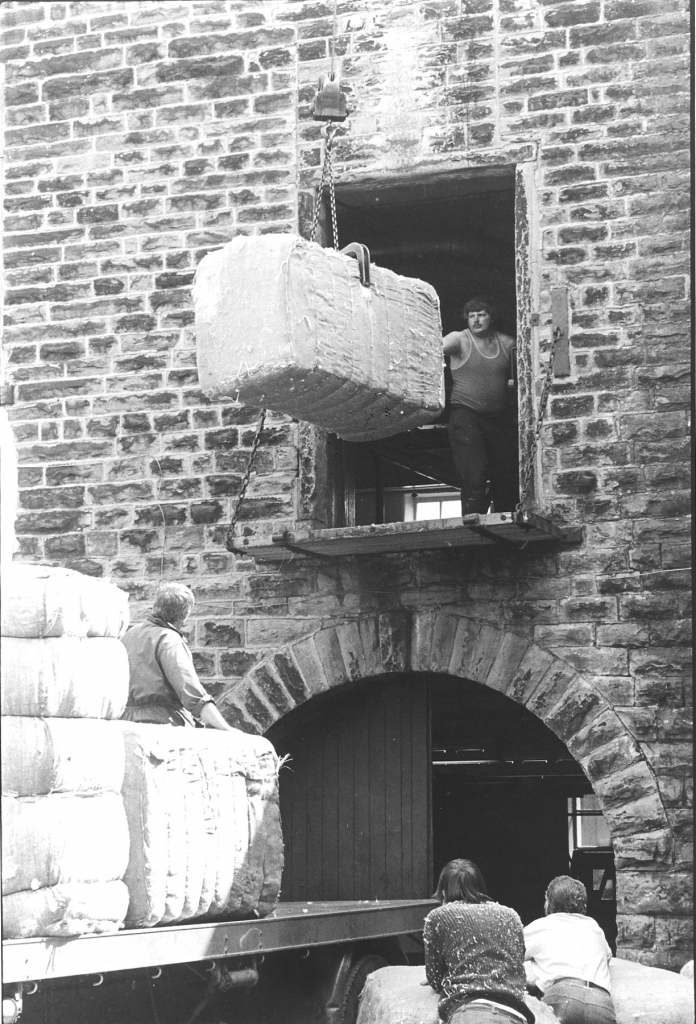
R- Actually that’s a hoist, that’s a crane. The man (Jim) in particular, is unloading the wagon here, and those are hard waste bales, I think. There’s generally three men on that job. There’s two men with a truck. He’ll fetch the bale in from the wagon and then its weighed. The other two men take it away on a truck, a small hand truck and its stacked. That’s all I can tell you now.
These bales up on the wagon, they look to be different bales, are they?
R- Yes. Those are comber bales. Super bales they call those.
Am I right in thinking that these bales are better quality?
R- Twice as expensive as those.
Because it’s better quality, it doesn’t have to be blended so much, is that right?
R- Correct, yes. But this is only the, how shall I put it, what the weavers leave, the cops are stripped, so that’s only strippings off the cops, but that’s proper cotton.
So that that’s still on the lorry is proper cotton?
R- Yes.
Yes, it hasn’t been through any process yet?
R- Yes, its come from a fine place actually, how shall I put it? When this firm buys bales, it already been processed once, it’s a kind of waste, its named as comber waste, which is a more expensive proposition than these.
So what stage of the manufacturing process have they been lifted off, as it were?
R- Well they’ve come from… well they might not have come from a fine place actually, it might be just all that had been done is just pressed you know. .. been dropped into a press, and pressed. It could be just ordinary cotton, raw cotton.
Raw cotton? Oh I see?
R- Just comber, comber waste, it is.
This archway is the entrance to the devil room isn’t it? The devil hole as you call it?
R- Yes, devil hole.
Did anything go straight through in to you?
R- No. It always goes upstairs first, which is processed before it comes down to me.
It goes through the blending machines even though it doesn’t go though the jumbo?
R- Well the blending machines, no it goes through the jumbo. These other bales they are used on the blending machines which go straight to the scutchers. They don’t affect to me at all. I don’t process those.
So you only process the hard waste?
R- I only process the hard waste.
Very good, right. Number 6.
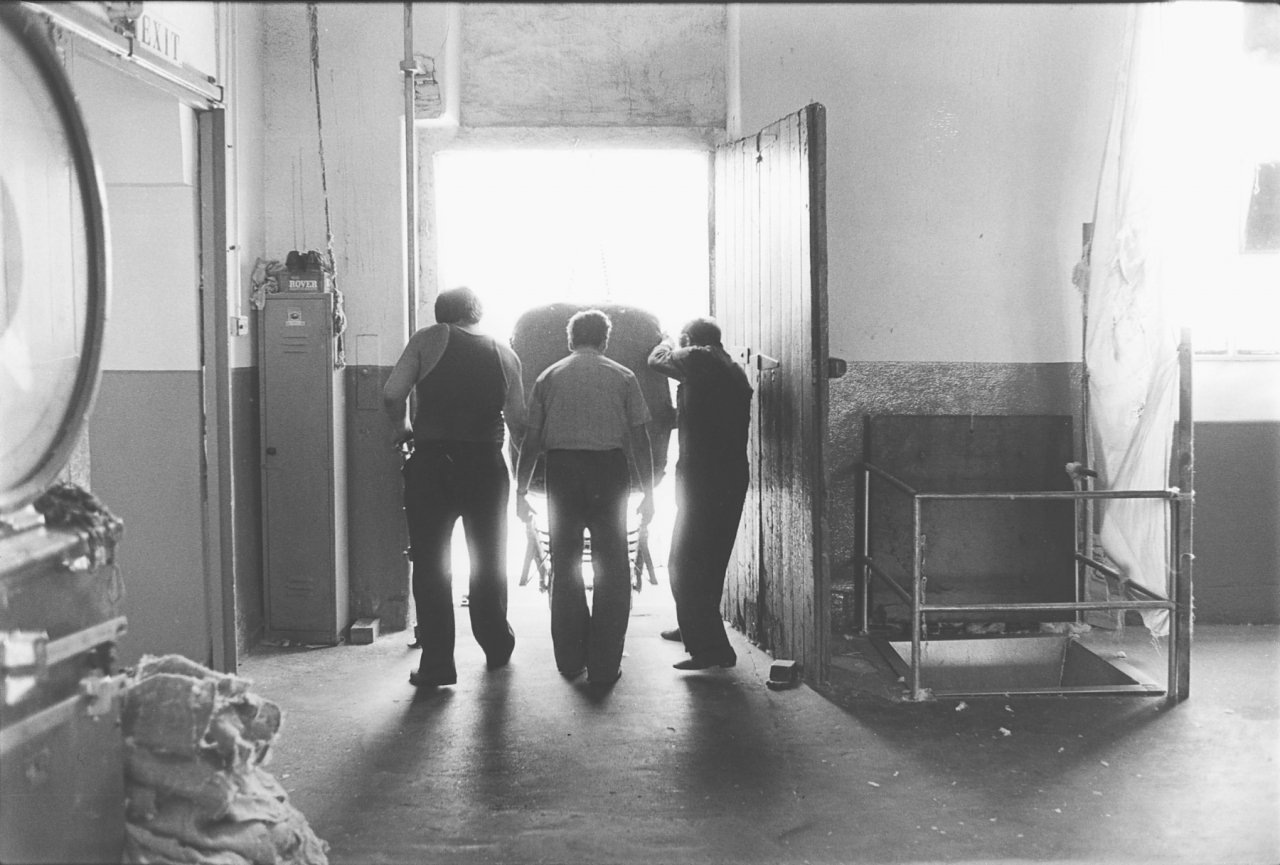
R- That’s what I’ve been telling you there. There’s three men there. When they come, when they fetch the bale in its weighed on those scales and its stacked there in a bale.
And its recorded, how much they weigh.
R- How heavy it is before its processed. Now these probably are hard waste bales and they’ll be going here where the jumbo‘ll be at this side here. The other side of this chute. That’s a chute to the devil hole.
So when does stuff go into that chute?
R- After its been processed through the jumbo.
And before it goes through the blenders?
R- Oh yes.
Yes.
R- For hard waste yes.
So in fact it goes down to you and then back up again to the blenders. Right, very good. What is this? Is it just a locker her on the left?
R- Yes, I think it’s Roland’s locker actually.
And this sacking here is from the bales that you have undone?
R- Yes, it will be the tare ends, as they’re named.
Tare ends?
R- That’s this part here, this part of the bale here.
The square part.
R- Yes. They’re cut off and they’re put in a..
So you don’t use those again?
R- No, no.
So Number 7 the actual weighing is going on there?
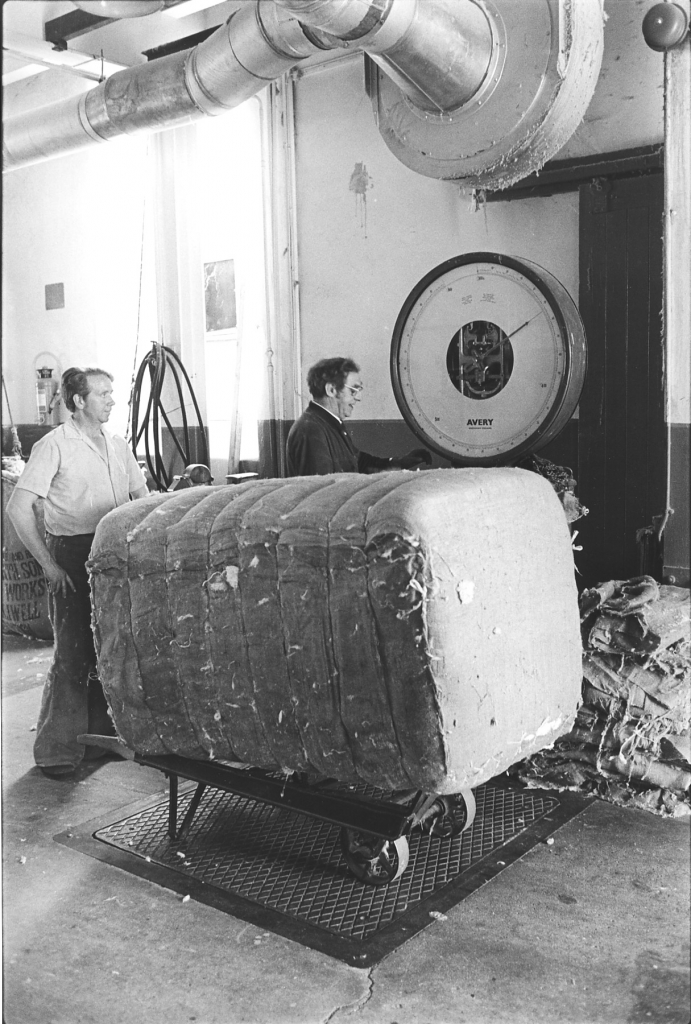
R- The weighing is in process there, yes. And the piping above is a fan, actually. Now that’s an extractor, a dust extractor.
From?
R- From the jumbo. See when the hard waste is being processed, all as the jumbo does to it is break any really big (clumps of) hard ends before it gets to me really, because otherwise it would fire down my place, bout (without the) jumbo, which it does, sometimes.
Yes.
R- And this pipe at the other end of there, there’s a door there and inside there there’s big dust bags which all the dust and muck goes into and that’s emptied out of there.
Will this be the same system that comes off the condenser cards as well?
R- Yes.
Its all the same piping is it?
R- No, that’s dirtier stuff than what comes off the condensers. Its on the same stamp, yes.
I presume that hosepipe on the hook there is a fire hose is it?
R- It is.
Likewise the fire extinguisher. There certainly seems to be plenty of evidence of safety as far as fire is concerned. But we’ll come back to your place which is one on its own isn’t it?
R- Yes, that’s why its called the devil hole, how it got that nickname, its had that many fires, its been named even before my time, I should imagine, maybe 1910, something like that, it’s got that nickname and its held it ever since.
What are the devils actually called.
R- Well they are breaking up machines actually, they’re blowing machines. They blow the waste through. It’s processed, they blow the waste through by air. So really they’re breaking up air machines. Even I don’t know the real proper name of them even after working in them so long. But I say they are that. But the nickname for them is devils.
And if there was an advert in the paper or at the Job Centre for your job it would it be Deviller?
R- Deviller required. Yes. I’ve seen it in the paper actually.
Fascinating. Number 8.
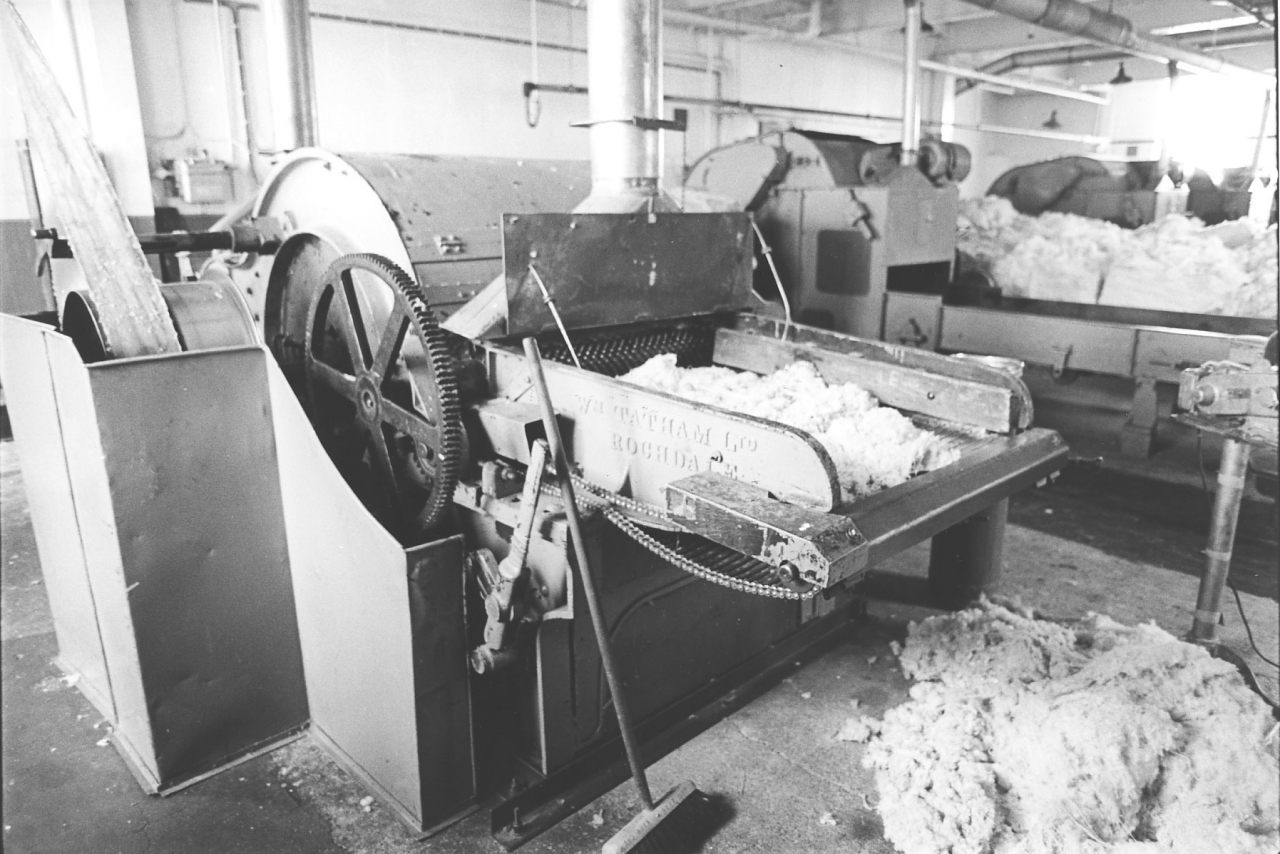
R- Now, that’s the Jumbo.
Again I guess that must be a nickname.
R- Yes it is actually, because that’s a breaking up machine as well.
But it’s called Jumbo because..?
R- Because it’s so large, that’s why.
But the actual machinery isn’t that large I guess.
R- It’s a nickname what its had through I should imagine through the ages and it still holds it, you know.
I suppose its more because its breaking up the really tough stuff.
R- A running down machine is the proper name for it. Its got the nickname jumbo, but it’s a running down machine. The cylinders are so large because its got all the breaking up to do.
Well the belt itself on that jumbo is massive.
R- Aye.
Well I suppose it has to be.
R- It has to be, otherwise it wouldn’t take it like. I mean it has a doffer at the front, which has pins in, and that’s the dust extractor I was telling you about.
And the machines we can see behind it are what.
R- The blending machines.
Yes.
R- All those different bales you can see there, dark shade, light shade, are all textured differently. We are supposed to take some off each bale to be blended, then we get a proper blend on the blending machines, which goes into the press actually.
But there’s no specific recipe for how much of what.
R- Oh yes, the carder or manager, Mr. Tomlinson’ll say what bales he required down for a mixing.
Oh I see, you call it a mixing do you?
R- A mixing. It’ll probably consist of two bales, then one dark comber, one a bit lighter, one a bit lighter still and a white one.
What is the difference between the colours Morris?
R- Well, really, if you don’t blend it properly it would show up on the cloth.. which you’d get a dark.. If you put in a light brown and you put in too much dark stuff in it would show up too much when its woven, and you’d get dark streaks in it and bits of white. So that’s why they used to use the blending machines.
Where does the colour come from then?
R- Well, its normal cotton is a light colour, as you know. Either they can make it really white, which is bleaching it, or they can darken it with some sort of dye.
Oh I see, so its come from other factories where it could have been through a dyeing process?
R- It could have been dyed, brown cotton, light cotton, and when they’re all mixed together, the manager says what mixings he wants, and the different quality. You could get one of super bales which is best quality and more expensive, so to economise he has to use maybe one expensive one and one of the cheap ones, see.
Right yes. And 8.01?
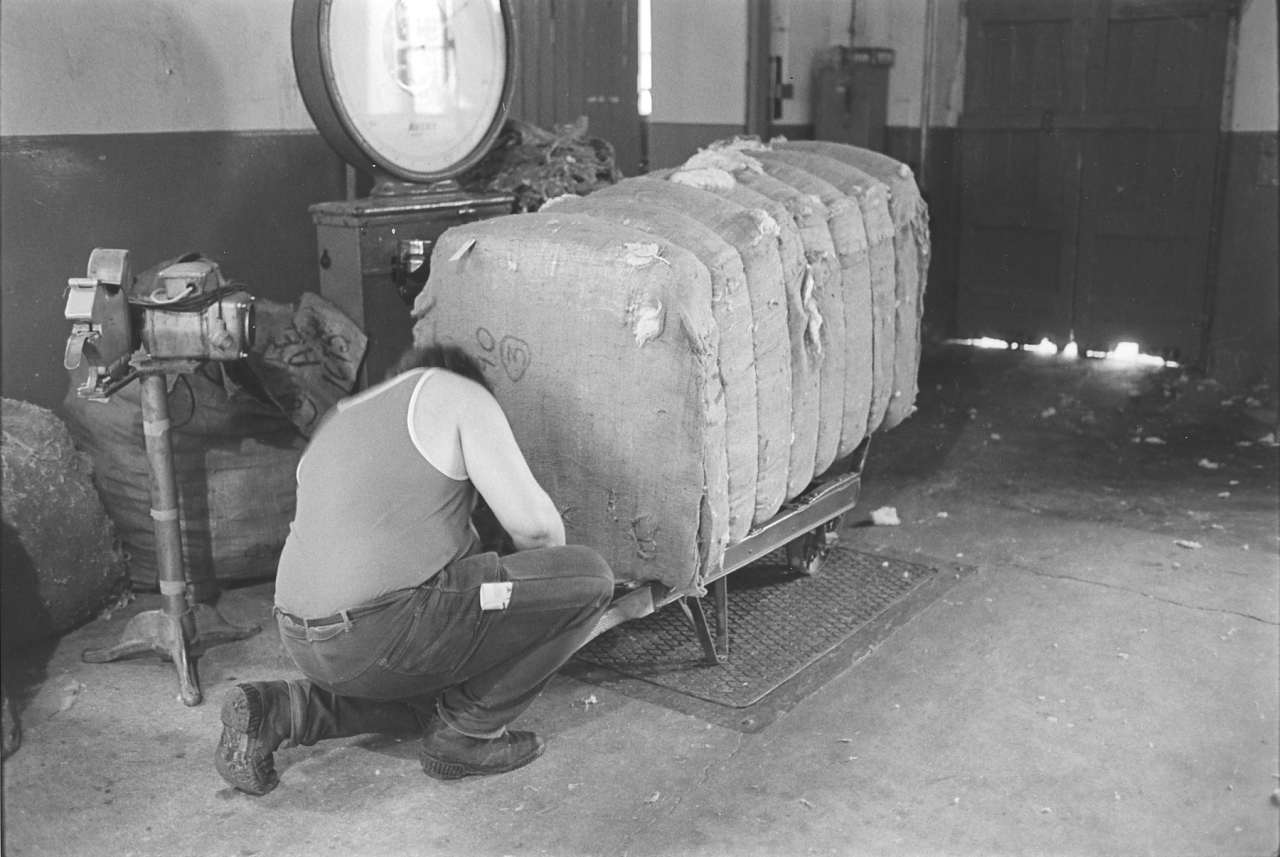
R- That’s Roland unfastening a bale. He’s taking the tare off there as you see. He’s cutting the bottom off there. Now he’s reweighing it again, now he’ll dump the bale and he’ll go there there.
He’s just about in fact to start feeding the jumbo.
R- He’s got to unfasten it first, take the wires out and everything, yes.
I should think those bands are quite dangerous actually, in fact 8.02.
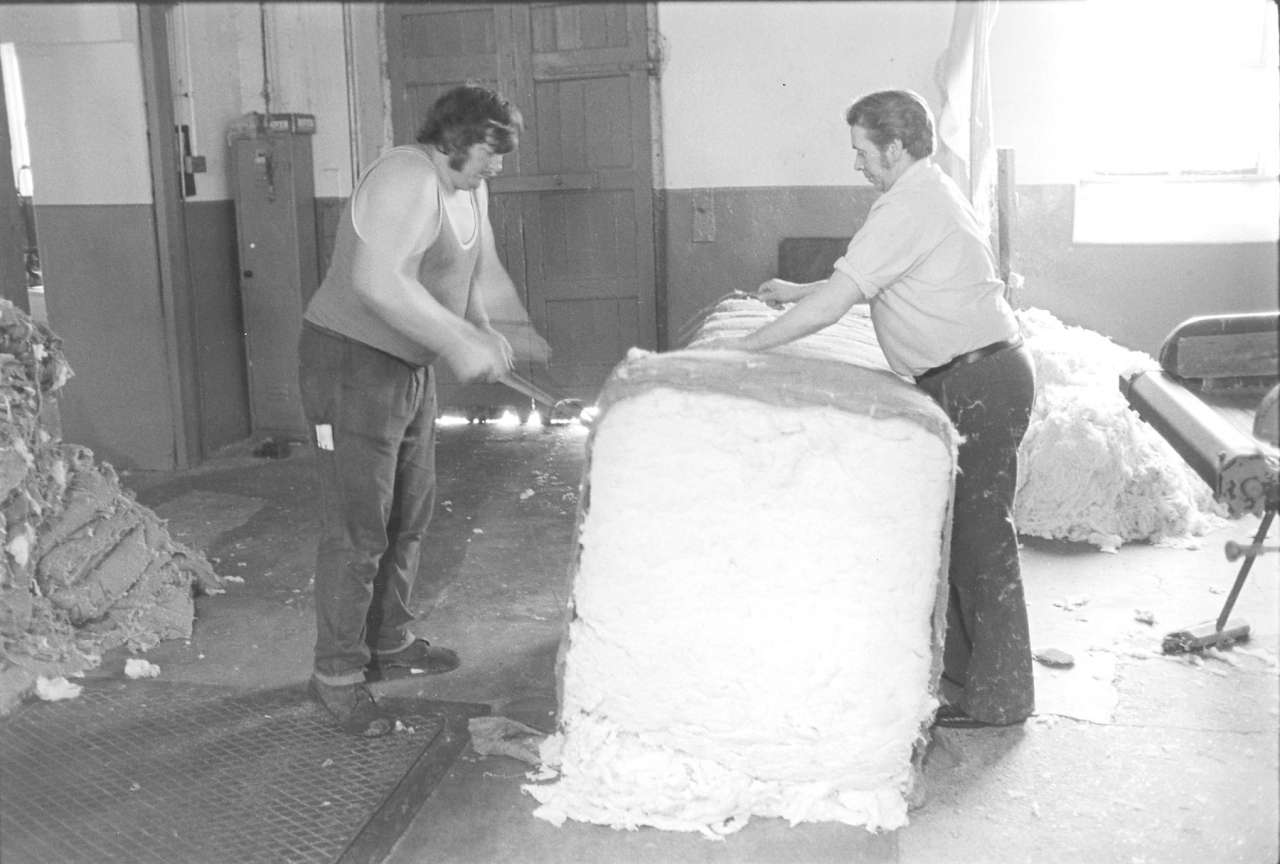
R- Yes, there he is actually opening the bale.
With, are they some sort of…?
R- Well they’re wire cutters actually, clippers.
And what is his mate doing?
R- His mate is making sure that they don’t fly back, you know what I mean? He has got his hand over there pressurising it while Roland opens the bale. You can also open them with an axe actually, those. Which a big axe they use on some of them. There’s bands and wires.
And he’s taken the tare end off there.
R- He’s already done what I showed you, cut ‘em off. Yes. There he is feeding actually.
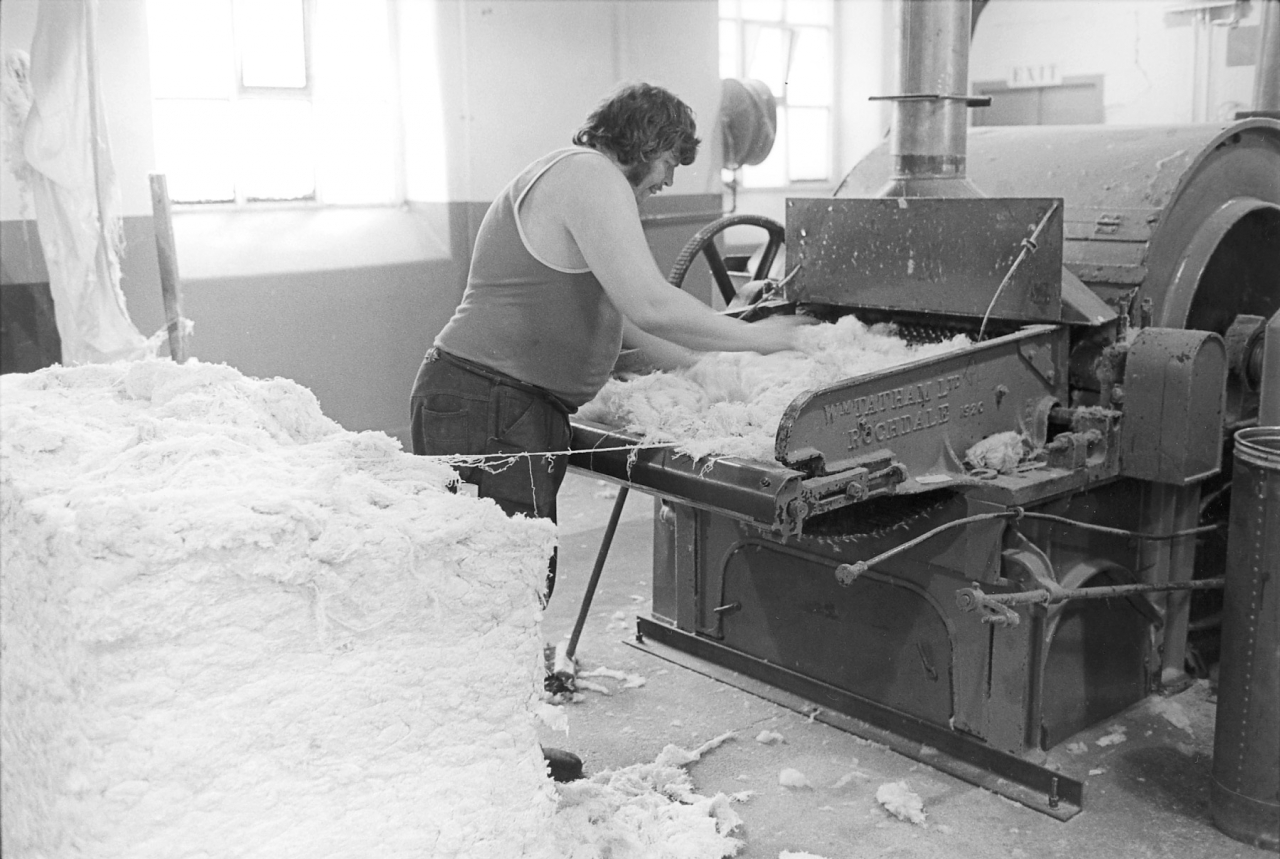
So 8.03, that bale is completely undone and he’s now started to use it in the jumbo.
R- He’s started to feed the bale through yes.
It seems to be thrown in. I’m sure there must be some sort of feeding skill to feeding it into the jumbo?
R- You just use your common sense really, It’s a matter of keeping you hands away from there, that’s the main job. No.
So it doesn’t have to be evenly spread or anything?
R- No, not really, but it feeds itself, once you put it on the back here. The rollers do the work there, there’s a spiked roller there, actually. The guard’s up there, but really the guard should be down to there, really, you see, so.. like the insurance would say why isn’t the guard up there you see. While you’re feeding there his hands shouldn’t be under there.
Well its all right, we’re not going to show it to the insurance.
R- Well, no I was just pointing out that’s propped up where it shouldn’t be propped up.
That I think against the window is another fire hose is it?
R- That’s a fire hose, yes.
Is there any fire problem with the jumbo?
R- No, not really. Bits happen now and again, but not much. I mean there used to be threepenny bits and all sorts in the waste once upon a time. They didn’t used to come like that, they used to come in bags. Bags of waste, cop bottoms they called ‘em.
The window sills here, well they’re not really window sills are they, they slope away. Do you know if there’s any particular reason for that?
R- No, I couldn’t tell you, no. I don’t think so, it just (the) way they’re shaped. I don’t think there’s any reason for those. But they don’t all slope. They do in the devil hole, and up there up in the spinning room they’re flat, some of them. They don’t slope down like that. Its happen just the way it was built.
What’s the lighting like in this room?
R- Good.
And do you have to have artificial lighting most of the time?
R- In the blending room? Yes. Because like its same as my department. Above me the only windows I have are at the far side. Well, the devil hole’s vast – there’s no windows above.
It always seems to be much darker in there though, in your place.
R- Yes, because they’ve more lighting facilities there because above them there’s …well no, I wouldn’t say it is really. No. It’d be all the same.
Perhaps I’ve always been when this door’s open.
R- Yes.
Because that would let a lot more light in wouldn’t it?
R- Of course, yes.
Now then 8.04
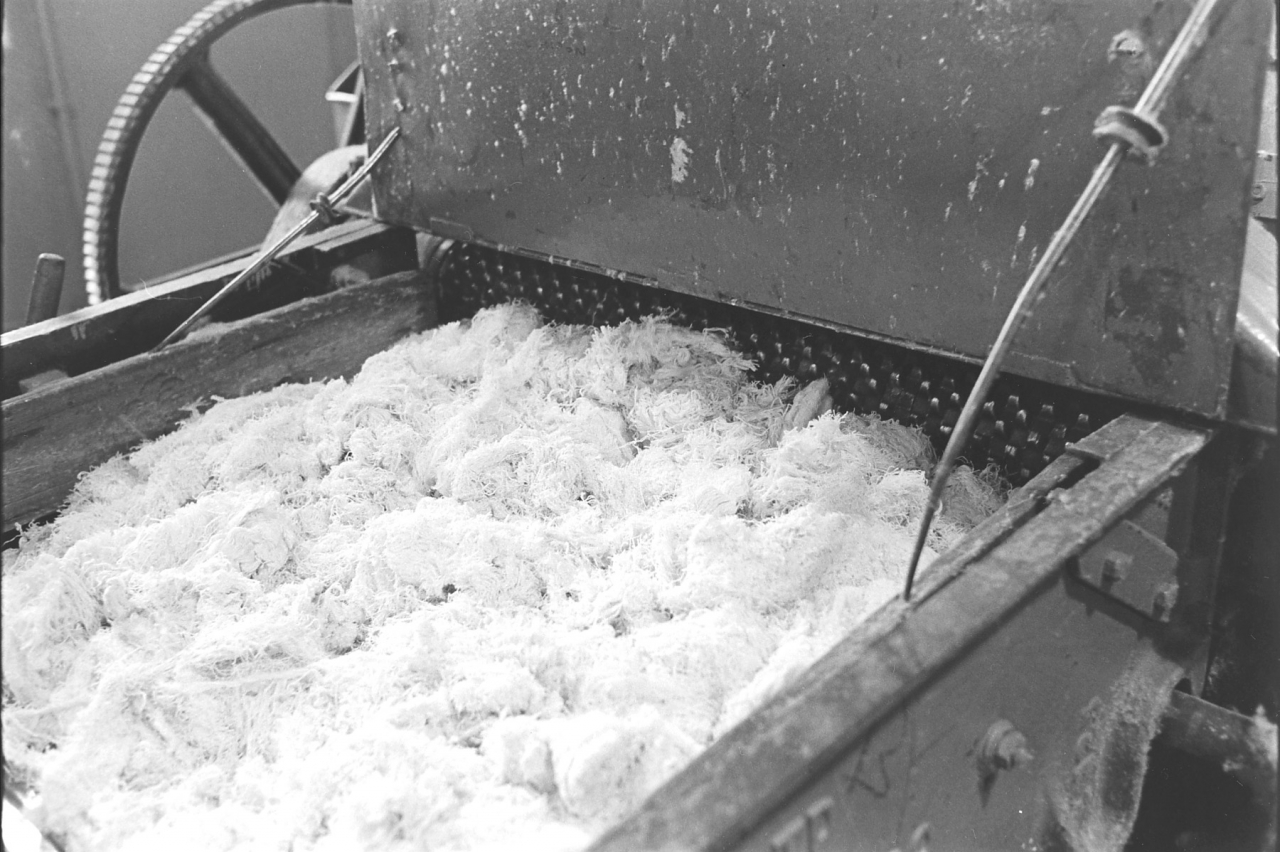
R- Well that’s a Jumbo. That’s the spiked roller I told you about. That’s the guard there, there’s nothing much else I can tell you about that.
What’s this fine rod for?
R- Well that’s a spindle actually – that shouldn’t be there.
Oh, a spindle?
R- A spindle. That’s a mule spindle. A spindle like they have on here.
Oh, is it?
R- Yes, so is that one.
Oh I know what its doing, it’s holding up that lid.
R- Its propping it up, it shouldn’t be doing really. Like, out of order really.
This gives you a fairly good idea of the sort of stuff that’s fed through.
R- Yes.
And I can see that it’s very matted in places.
R- Well there’s tubes, there’s all sorts in it. Cops.
What happens if you get metallic or non cotton things going in.
R- It’d take ‘em through.
Oh, would it?
R- Oh yes, but like I say, it’ll take metal as well will that, where mine won’t. Because that, that at the back, that cylinder hasn’t as many teeth as mine. The teeth are bigger, they’re about that large, are the jumbo teeth and about that thickness.
What would you say that is – about ¾ inch?
R- Yes, and about the large.
About one inch, one inch large?
R- One inch, yes. So the risk of fire is 50% less than mine, the particular department I’m in. Here at the front, you see, there’s another extractor, which actually this stuff is very dusty at times. This extractor should take the biggest majority of that dust. That cover should be down by rights, like, but it isn’t.
We’re on 8.05 now aren’t we?
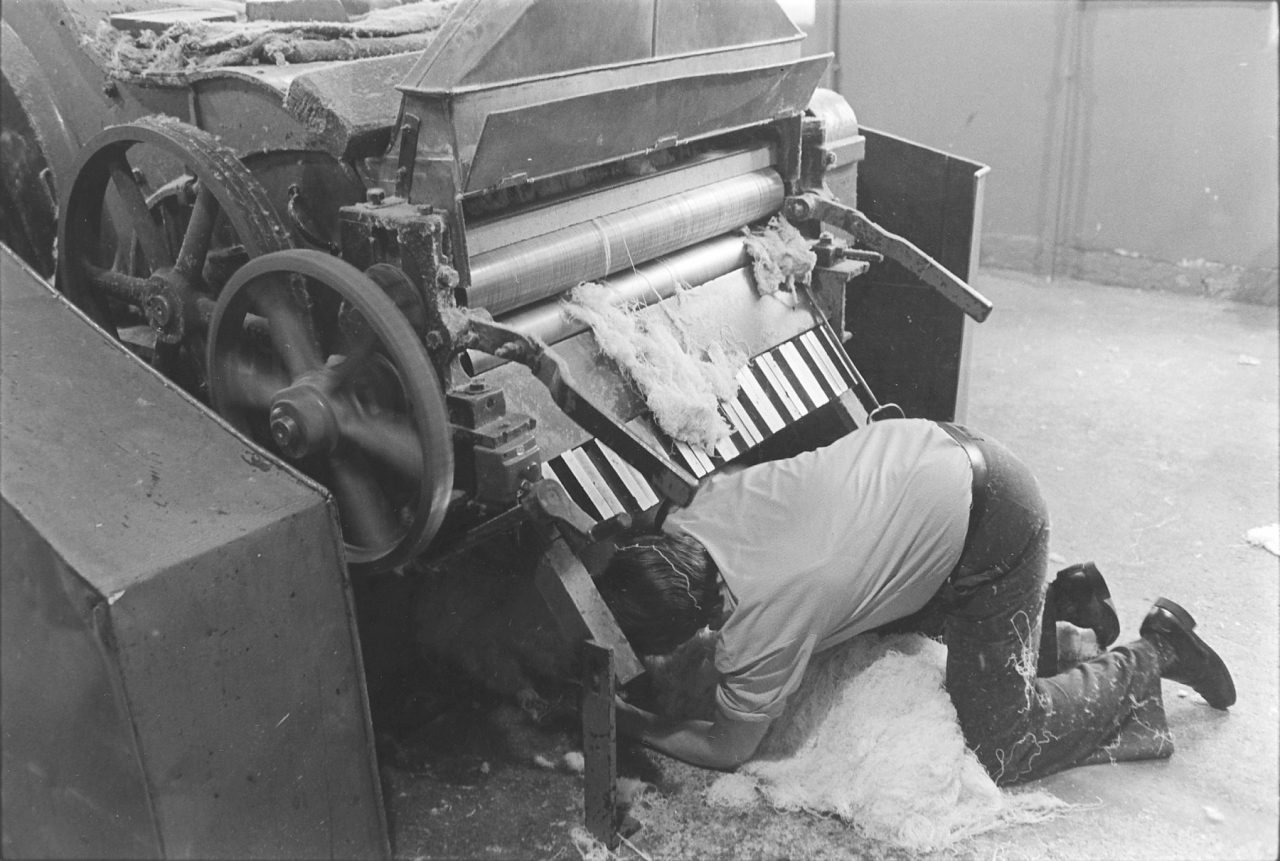
R- Yes, 8.05. So this is the back now, and that’s the front. This is the back of the jumbo.
And what’s going on here, it looks as though we’ve got a breakdown.
R- No, we haven’t actually. Some of this material they’re buying now, like I’ve said before, its shorter, so therefore, in between here instead of it picking it up, the longer stuff it’ll pick it up, these pins’ll pick it up and it’ll come through the roller but the shorter stuff it’ll likely to drop behind.
Oh I see, so if you’ve got short fibres, is that what you mean? Short fibres?
R- It’ll drop them behind.
It fails to come through the system?
R- It wouldn’t do, really, normally, on a proper running down machine, like this machine, they’ve had a few breakdowns, really there should be underneath there a slide so he wouldn’t have to go underneath there, you understand. You’ll take particular notice that the machine is stopped at this particular time while he’s under there.
Oh, I thought it was running because you see a certain whirr on that last wheel.
R- No he’s not supposed to be under there, not really.
So this is the chute that it comes through when it’s been through the jumbo?
R- Yes.
And then it will come down to you from here?
R- From there it goes down the chute, which we’ve already seen on an earlier picture.
Am I right in thinking that the people on the jumbo have to carry this stuff down to the chute – there’s no sacking arrangement is there?
R- No they carry it to the chute.
It seems rather…
R- Well, the distance is not very great.
No it’s not, but we have to note that there is a guard on the..
R- Oh yes the guard. That’s well guarded there.
On the left hand side..
R- Oh they all have guards on there, though it’s not being used.
Ah but this one is, isn’t it, or should that one be over that.
R- No, that’s where its…
8.06
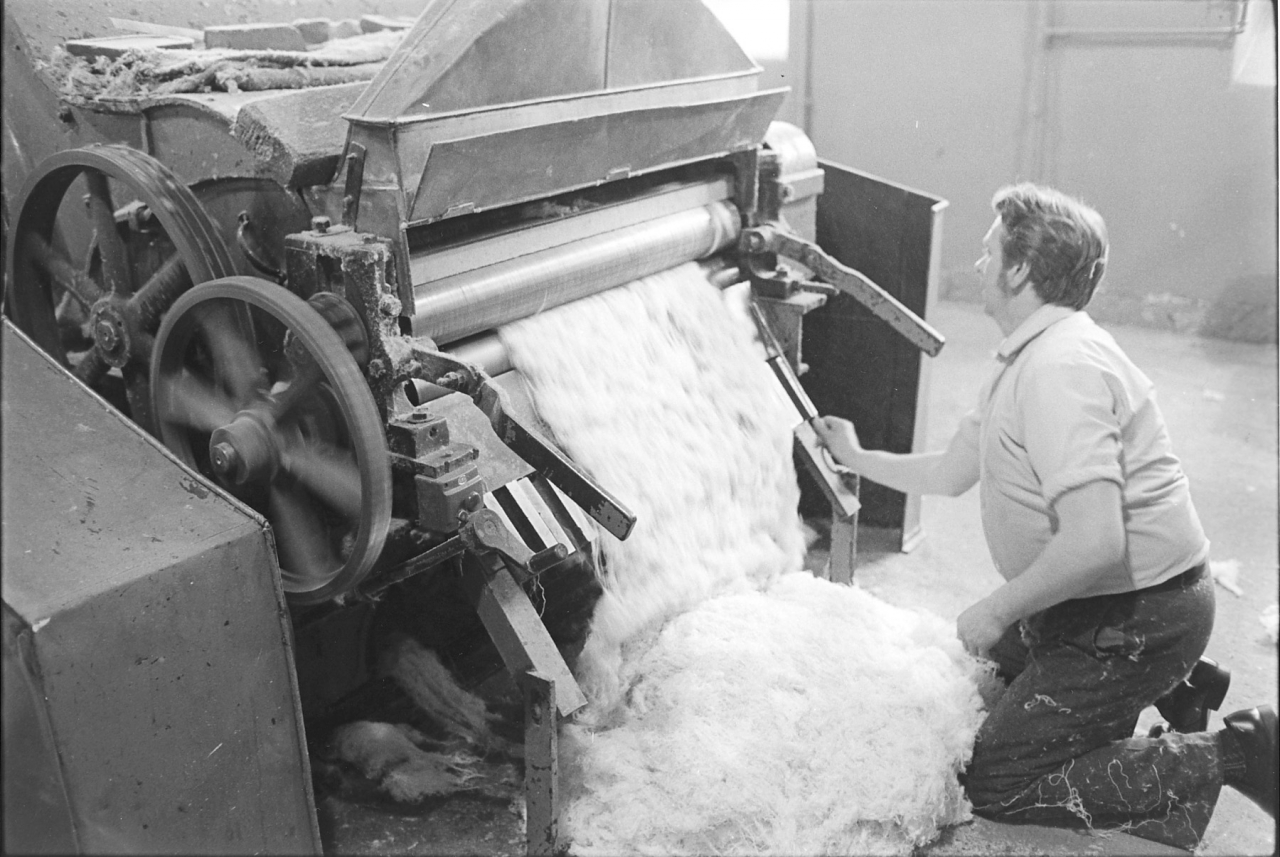
R- That’s it in operation, that’s the way it should be, running out there.
And this is after it’s been through.
R- Yes, it’s ready to come to me now, as it is there. You see how fine it is now to what it were at the beginning? Its been broken up like.
But I think there’s a more significant difference between you feeding your stuff in and what comes out the other end. I mean there’s a big difference by the time it’s been through those six cylinders.
R- Well there’s six cylinders there to finish it really.
Why is he on his hands and knees?
R- Well you’re not forced to be on your hands and knees, but Jimmy, he’s there, he’s ready to pick this stuff up. He’s scooped that round in there and he’ll carry it over to the chute. If you see he’s using a hook there.
I was just going to ask you about that hook.
R- Well that hook…these at the front are magnets.
What those oblong different coloured..
R- All those are magnets. When any metal comes through those magnets’ll pick it up, so that it doesn’t get to me actually, otherwise it’s a disaster if it gets down there.
I would imagine so, and those are strong enough are they, to hold the metal on, even though there’s a constant flow of
R- Oh yes. They’re very powerful magnets are those.
And what’s he using this hook for?
R- Well really, if you press down on those arms, that roller moves, lifts up and you can hook the cotton out to pull it through the rollers. Sometimes it’ll go up here, behind here.
Oh I see.
R- You see the draft might take it you see, so you pull it through. Once its through it’ll feed itself through.
So every time he breaks some off he has a look to see if there’s anything on the magnets, does he?
R- Correct. The magnets should be cleaned every.. well every time he moves away, as he clears away the waste, the magnets are cleaned off and the metal’s put onto one side in a tin or something
So 8.07, as you say he’s just getting ready to lift it into the chute..
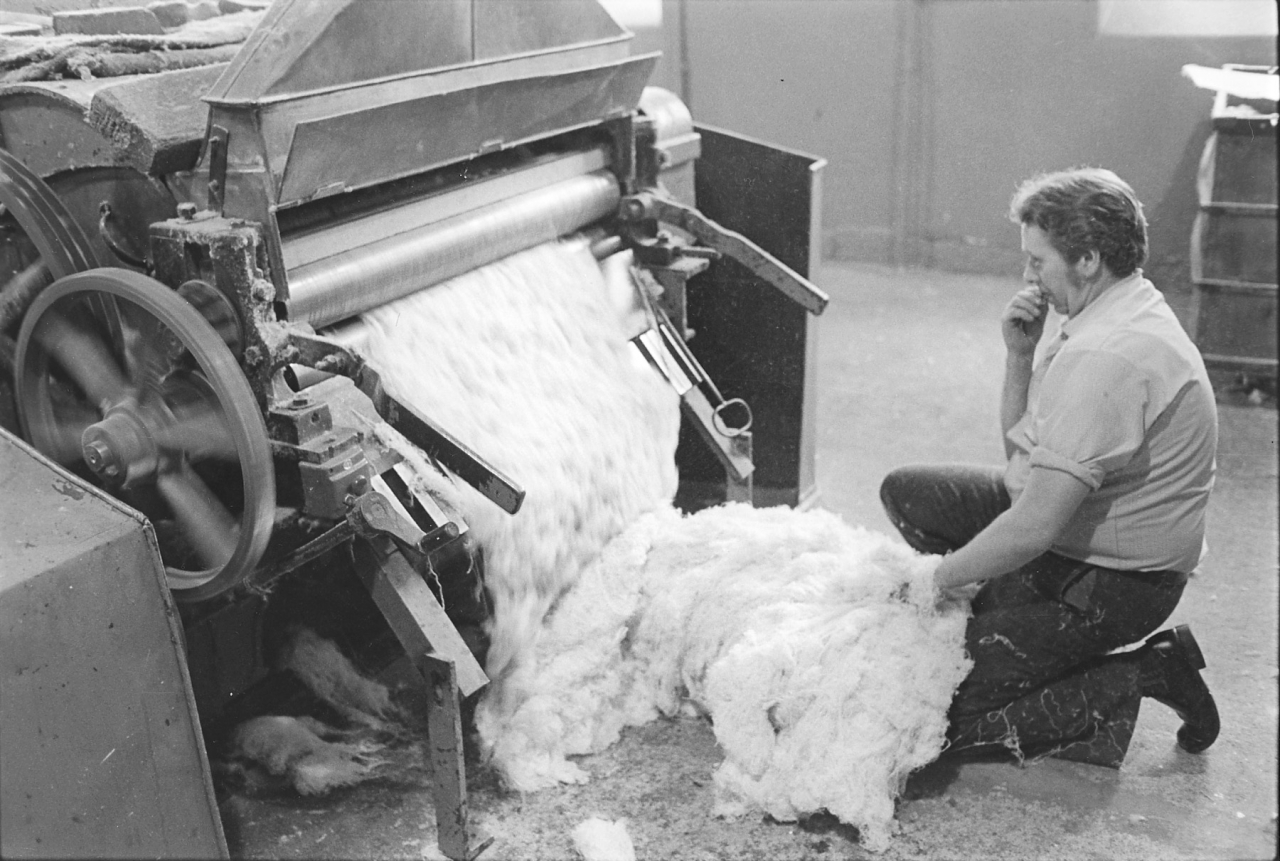
R- Correct.
8.08
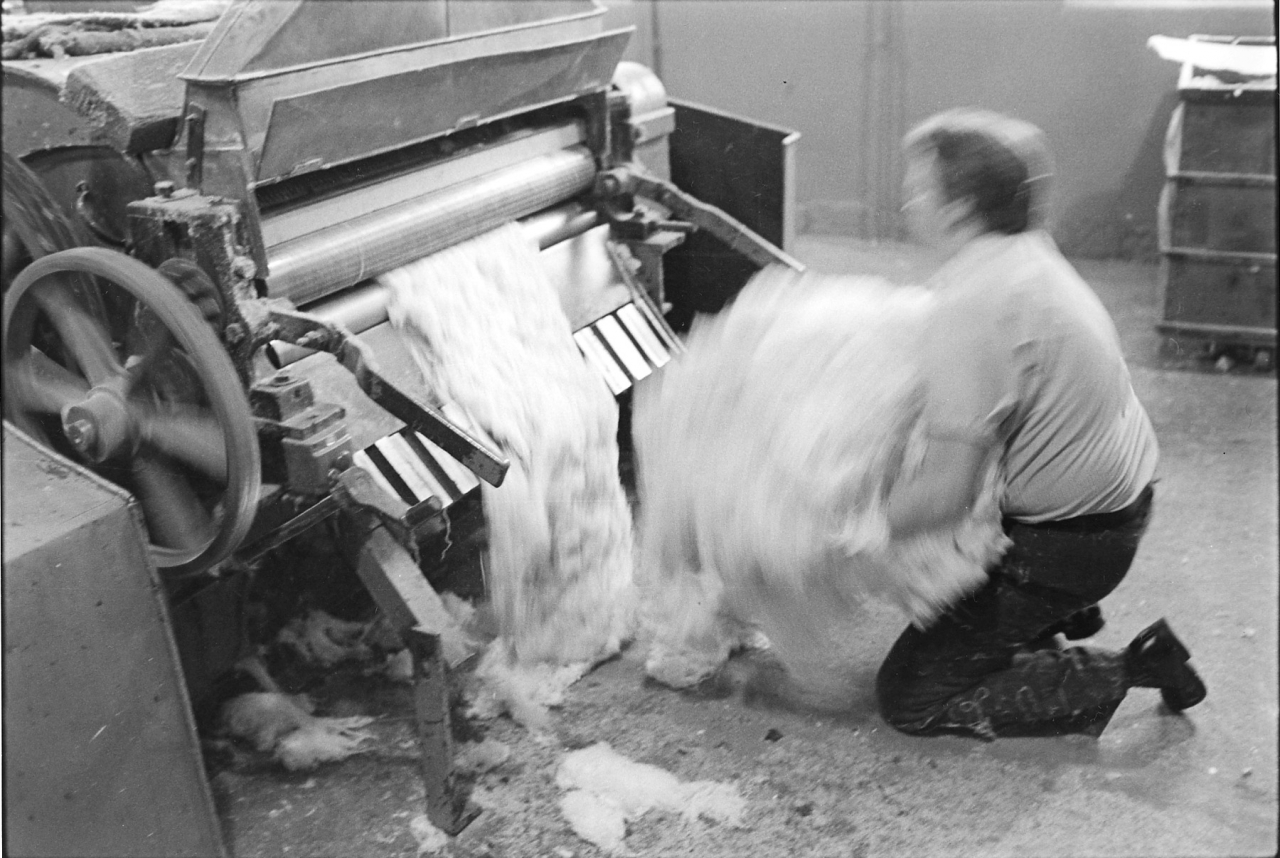
R- There he’s lifting it up you see.
And those are the magnets now, I’m a bit clearer.
R- Those are the magnets, they’ve probably be cleaned now, by then. He’s lifting the waste away and the magnets have been cleaned. Those are very powerful magnets. That’s what they’re used for, to pick up the metal. And they’ll pick up anything from the piker sile [unclear] even those big things at the back. They’ll even hold them will them magnets.
Spindles?
R- Yes. They’d hold a spindle.
8.09
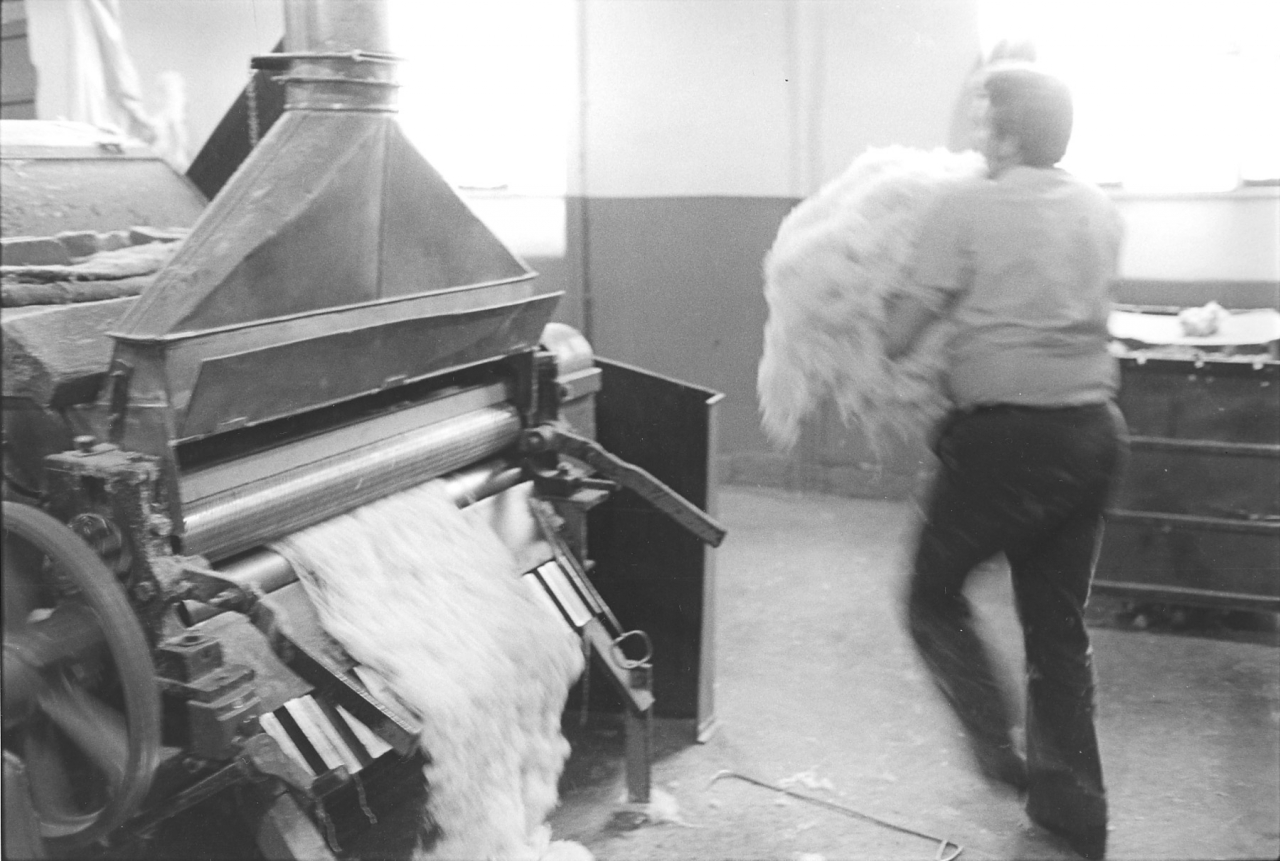
R- He’s carrying the waste away, actually. There’s the hook I’ve been telling you about.
Um. There’s something else on the floor.
R- Well, that’s another hook, that’s a spare hook he’s got, he’s had that in his locker probably. See the magnet’s holding that hook.
Oh I see, it’s not hooked onto anything else?
R- No, no, the magnets are holding onto that.
Very good.
R- So you see how powerful they really are? I mean that’s a big piece of metal really.
R- There’s Roland puffing and blowing.
8.10 Puffing and blowing? And he just has to make sure that its all been fed in properly.
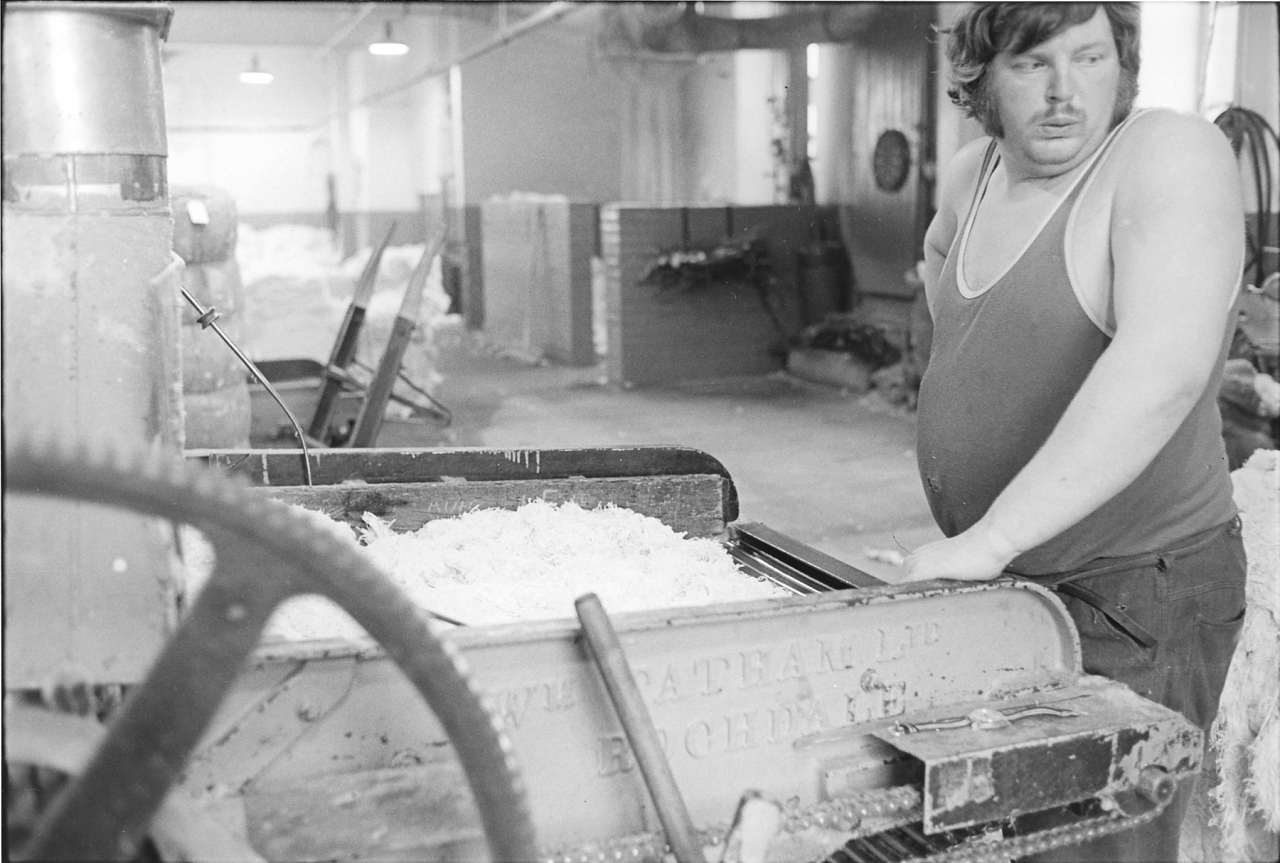
R- Oh yes. Yes. And he’s a handy lad to have about.
Why is that?
R- Oh he’s as strong as a horse, oh yes.
The brick enclosure at the back of the photograph is where it comes up from you is it?
R- Yes, that’s where it comes from me; there above is a Shirley wheel.
A what?
R- It’s named as a Shirley wheel.
Oh yes?
R- Which is used by draft, and an arm which, when the weight comes in, the draft pulls out. As soon as the weight of cotton comes it’ll open up and it lets out the cotton. The wheel wheels it out. Its nicknamed the Shirley wheel …I don’t know the proper name for it actually. [That is the right name, named after the Shirley Institute where it was developed.]
Oh I see. Right.
Tape ends.
Transcribed by Catherine Pearson, November 2003.
Checked and formatted by SCG/November 25, 2003
